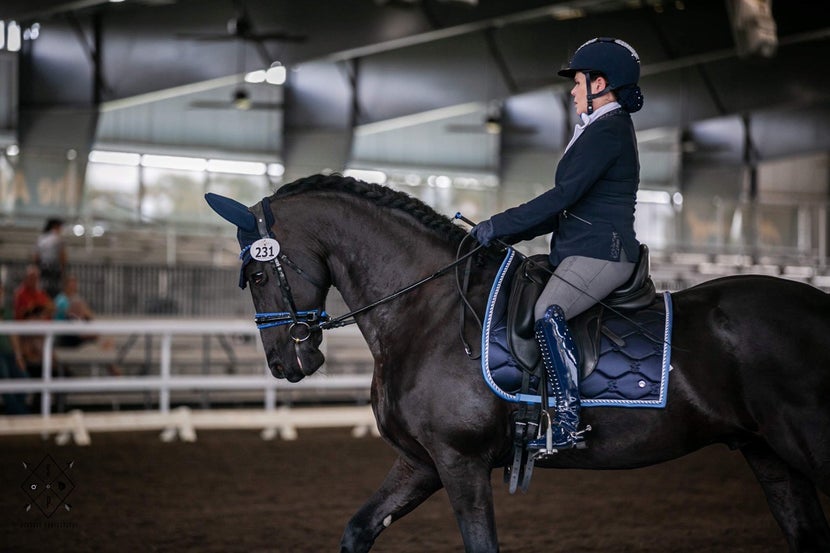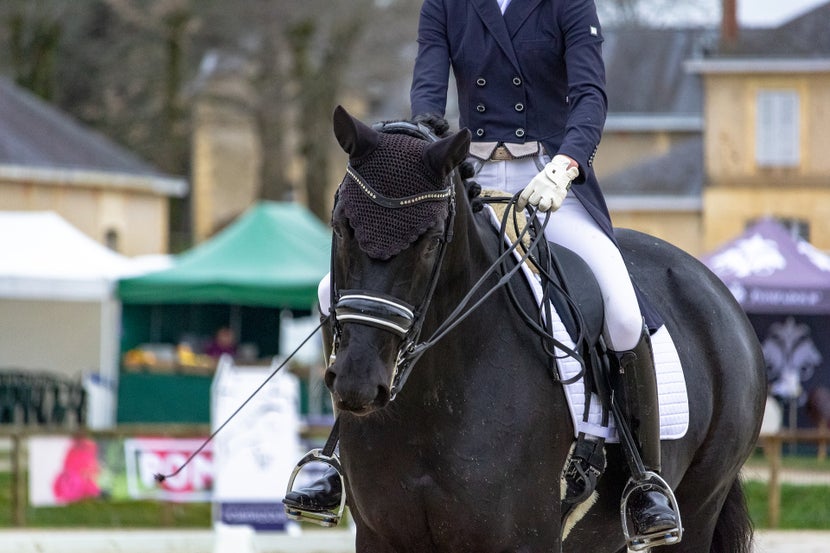Breeding Dressage Horses
Taking on the task of breeding your own horse for your riding discipline is both fun and intimidating. We asked RW-sponsored rider Jackie Eckhaus about her experience with breeding dressage horses that have gone on to compete at high levels. In this article, Jackie will address her thoughts on several aspects of breeding, talk about her accomplishments, all the while providing helpful guidance. Having learned a lot from breeding and raising her own dressage sport horses, Jackie has great insight we're sure you will enjoy!

Background on Breeding
Q: How did you get started with breeding horses for dressage?
A: I was transferring from eventing to learn more about dressage, because eventers do limited dressage. I had this pretty nice Thoroughbred mare, and I took her to DG Bar Ranch because Willy Arts was big into dressage (they had stallions and he was teaching). He had a look at her and said, "Take her to the keuring!" So, we bred her and took her to the keuring; they were accepting Thoroughbred mares at the time at the KWPN, and she ended up being second in the nation and accepted into the stud book. I wanted to improve as the years went on, so I went to Holland and bought a pure Dutch Warmblood mare who had already produced some top young horses. I imported her to breed with, and that's how I got started! Willy had a good eye, and I learned a lot from him in the beginning about breeding. That started me off learning about and breeding Warmbloods, because I had previously been Thoroughbreds and backyard horses (and anything else I could ride growing up).
Q: What lessons have you learned from starting your own breeding and training program?
A: It's not for the faint of heart, because there are a lot of ups and downs. Your mare may sometimes not get pregnant for two or three breedings, and that's a lot of money. There may be times when they abort for no reason, and you don't know why, even with testing. There's also nothing better than when you walk out and you have this baby coming, and you're waiting with your mare and are so excited; it's kind of like having kids! You don't know until you're the "mother" of the baby foal that you realize how excited you are to dry them off and hug them. You sit there for the first two or three hours worried about whether they're nursing, standing up, and such. Breeding takes a lot of patience too, because you always want to help more than you should.
I think the biggest thing that is you want to have the best mare; she doesn't have to be perfect, but she has to be the best you can get. You don't want to breed a horse that's, "Oh I hate riding her, so I'm just going to breed her." Why would you do that? Why would you want another one of those? The foals take about 70% from the mother's side, then you get about 30% from the sire's side. They might look like their dad, but they're going to act like their mom because they're mostly raised with her.
With training, you want to do everything with your baby and start early. Putting the halter on in the stable, teaching your baby to lead alongside their mom going in and out, brushing, picking their feet up and down—it's all really helpful. Handling is important, but in short spurts; they're babies! It's so complicated and yet not, and that's why raising young horses is a challenge. Sometimes, you don't even know and it's, "Do I do this? Do I not do it?" They can get sick, and it can come on quickly, so there's just a lot to keep an eye out for. It can be hard to sell foals, and some people are successful at it, but I do better when they get to be about three years old and started under saddle. If you don't want to go through three years of a lot of hard work and ups and downs, then just go buy what you're looking for in a nice three or four year old. With breeding, you don't know exactly what you're going to get, and it takes years to make a good horse. You can read all about bloodlines and research all you want, but the baby could still not quite be the dressage horse you were hoping for.
Q: What do you look for in a dressage horse?
A: You want a nice moving horse that carries itself in an uphill, natural state. Temperament is really important! Every horse has rhythm, but you want pure rhythm (purity of gaits). Suspension in your trot is very nice, because as you collect it you get passage and more. You want reach in your trot and a bending of the hocks, with a hind leg that comes under rather than one that comes up and pushes out from behind. I think size is important depending on your size; some people worry when a horse is only 15.2 HH, but if it's a nice-bodied 15.2 HH it can be perfect for you. Some other people get worried about an 18 HH horse, but if it's a well-balanced 18 HH then it's not all that difficult to ride either. It's more to move compared to a 16 HH horse, but I wouldn't write it off the list if it's a really good horse.
I think that all kinds of horses can do dressage, and I wouldn't mark any of them off since dressage is the training of gymnastics in the horse—it can be taught to every horse to improve them and their movements. The question is, "How competitive do you want to be?" You can start dressage on any horse you have, learn a lot about it, and practice the exercises to see how far you can get. Then if you really love it, look for the next horse that is a little more capable and gymnastically inclined through conformation, temperament, and natural ability. In the beginning, I rode everything I could get and did everything I needed to do!
Q: What have been your proudest moments with the horses you've bred?
A: I've had six homebreds qualify for and go to the Young Horse National Championships. Just getting on the list of top 15 in the US is pretty exciting, then getting to go and compete there is just great. I also had one qualify and go to Gladstone for the Intermediate Championships, and I felt like I made it because all the big riders were there. Last year, another one qualified for the Developing Prix St. George Championships in Chicago; that was the same horse that went to the Young Horse Championships and is still qualifying and going up the levels. I'm pretty proud of that, and I've also had five or six go on to the FEI levels. It's pretty cool when your breeding program is continuing on up and expanding, like my three Grand Prix horses that I bred. Being at the mare championships in Holland felt pretty prestigious, because it's a huge country with a lot of breeders. I was really proud to go watch my horse there, and she placed in the top 45 of the whole country—then she ended up in the top 20. To me, that was as good as winning! There are breeders there that have been breeding for 50 years and have 30 broodmares, whereas I had my one mare. It was my plan and expectation to get to the high levels. If you don't have dreams and goals, you're never going to get there!
Q: How do you help your nerves when your foals begin competing?
A: I actually don't really get nervous, and it's more good nerves and pride. You're so excited—no matter who is riding one of yours—that you almost can't believe your baby is out there (it doesn't matter how old they are, they'll always be your baby). It's also exhilarating because you want them to do good, but it's just like when you're showing; it's good nervous energy. No matter how they do, you're still proud!
Q: What do you look for in a broodmare?
A: Definitely breeding—you want to know their breeding lines. If they've had some foals, how did they turn out? Did they go to keurings? She has to be a good mover, and consider how she is (or will be) with her foals. My mare that I imported was the best mom—so kind! She was fun to ride too, and she competed through Third Level with her athletic capability. She also produced jumpers! I think I've loved the disposition part most, because all of her babies are talented, like to train, and have the will to do well. Now, one of her foals is my next broodmare! A pretty mare is always nice, and good conformation and size with solid legs will produce well, even if they're not absolutely perfect.
Q: What advice would you give someone considering breeding their own dressage horse?
A: Are you financially, emotionally, and logistically able to handle it? There's a lot to it, especially if you're breeding for the first time. I would advise consulting with a well-known breeder that's had many foals and really listen to them. It's a long-term investment that can be extremely rewarding, but also everything can go upside down in a moment. You have to be able to cope with anything and everything, like tragic losses. It's not for the faint of heart, but you will have more ups than downs. There's nothing more fun than watching that baby grow day by day, whether it's them running around in the field or playing with you. I'd really consult with people who have been breeding for years and ask lots of questions. If you're not ready to foal yourself, send your mare to the vets to have the foal in order to save yourself the trouble and sorrow; sometimes the little things get forgotten from all the excitement. Be prepared!
Closing Thoughts
We hope you enjoyed coming along with us to hear Jackie's personal experience with successfully breeding winning horses for dressage and more. From her intent with the mares she chooses to breed to the training program she follows with her babies, Jackie has definitely gained a lot of insight over the years. Whether you're a backyard breeder or run a professional breeding program, there's always something to learn from other breeders. Should you have any questions, feel free to contact us at 1-800-620-9145 or info@ridingwarehouse.com. Happy breeding!
